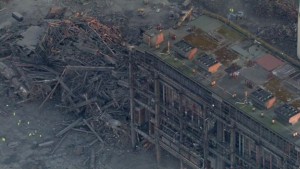The recent tragedy at the site of the Didcot Power Station in Oxfordshire, was broadcast far and wide across the many news outlets. I was shocked at the scenes and the death of at least one person as a result of an unexpected building collapse.  I was perhaps even more shocked that the Birmingham-based company who had been hired to carry out a controlled demolition of one of the towers admitted that they had never been involved in a project like this before.
I was perhaps even more shocked that the Birmingham-based company who had been hired to carry out a controlled demolition of one of the towers admitted that they had never been involved in a project like this before.
Kieran Conaty, who was leading the work featured in a company video in December, when some of the work had started and said.
“We’ve never done anything like this, but we are that type of a company that we learn to adapt, and we tried to bring in some expertise.”
Let’s get one thing straight, in no way is this article an attempt to belittle the horrible tragedy that led to the loss of life at Didcot. Unexpected death is always heart-breaking. And yet, the immense coverage and inevitable news slant questioning health and safety and whether the workers involved were given adequate safety or management training or not, got me thinking.
In Britain we want things both ways. We want training, we demand retrospective action if accidents happen – we’ve become rather litigious like our friends across the pond – and yet, the British people cry ‘Nanny State’ at any opportunity. “You can’t even play conkers any more” is always one of my favourites.
Of course, there is also the very serious double standards when it comes to training and safety agendas at various points in the supply chain. Let’s take as an example the enormous coverage that the 50p increase in the minimum wage is getting in the UK press at this very moment. Many of the plethora of UK workers on minimum wage salaries are in retail. Many high street clothing stores get their clothes manufactured in Bangladesh, India and China. Who remembers the unspeakable tragedy that happened in the clothes factory in Bangladesh in 2013? 1100, yes one thousand, one hundred people died in April, 2013 when a dilapidated building collapsed, bringing into temporary focus the horrendous conditions under which the country’s many workers strive to complete impossible orders to satisfy our insatiable demand for clothes we don’t really need.
While there have been efforts to enhance safety and training all the way along global supply chains, by British organisations like The Institution of Occupational Safety and Health (IOSH) and Fashion Revolution (who were founded in the wake of the Bangladesh tragedy), it is safe to assume it is just a matter of time before the next major disaster highlights the double standards and unbalanced agenda setting that exists in relation to training and health and safety in the media and within corporations. In the meantime, perhaps those with a moral conscience should, where possible look to keep purchases that involve unsafe working conditions at any point in the supply chain to a minimum. Sticking to the fashion example (but not exclusively), the Still Made in Britain drive and companies who design and manufacture here under the rigorous demands of health and safety legislation is something to get behind.